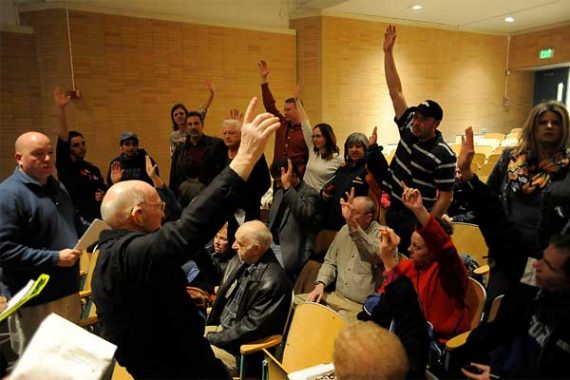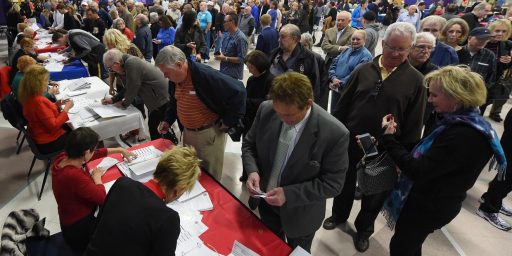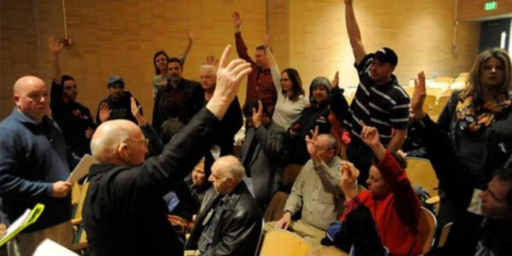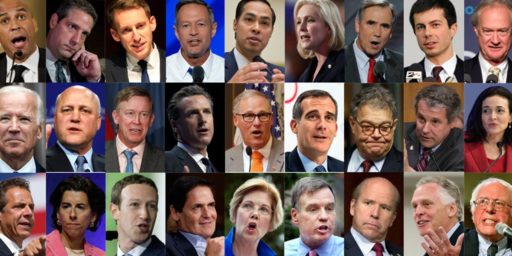Time To Get Rid Of Caucuses
This is no way to pick a Presidential Nominee.
Echoing a theme that has been touched on here at OTB by both James Joyner and myself, John Avalon argues that it’s time to stop using caucuses to pick Presidential nominees:
There’s got to be a better way to pick a presidential nominee.
The high-stakes nature of each early caucus state—giving the initially declared winner momentum, media attention, and money—makes these apparently rampant bureaucratic errors unacceptable.
In addition, the caucus system is fundamentally unrepresentative, disproportionately dominated by semiorganized bands of activists, and leads to low turnout.
Even after the endless media hype surrounding the GOP primary contests this year, turnout was essentially flat in the Iowa caucuses between 2008 and 2012, despite the absence of a Democratic contest to siphon off participants. Turnout was dramatically down in caucuses in Nevada, Minnesota, and Colorado. In Maine, fewer than 6,000 voters bothered to participate—roughly 2 percent of the registered Republicans in the state. Overall, caucus turnout is averaging about 10 percent of registered Republicans in each state.
Moreover, those 10 percent who do turn out tend to be the most ideological and hyperpartisan—meaning that the winner of a caucus is increasingly a bad barometer of who might actually carry the state in a general election by being able to win over independents and centrist swing voters.
Primaries inspire a much higher turnout—and a more representative sample of the state electorate if it is an open primary—at least in part because of the minimized hassle factor. You get a secret ballot and swing by your polling station at any time on Election Day—or participate in early voting where it is available, or cast your ballot absentee. After all, unless you’re a political consultant, the point is to have as many people vote as possible, right?
Not really, no. One of the unstated truths of political campaigns is that you can win an election by discouraging people from voting nearly as easily as you can by convincing people to get out to the polls and vote for you. Sometimes, this is done nefarious means such as the various attempts we’ve seen to trick certain voting blocs, usually minorities, that Election Day isn’t on the it actually is (a tactic that I personally can’t believe anyone is dumb enough to fall for), sometimes it’s done just by hoping that it rains or snows in a particular part of the country or state on the day votes are being cast, thus making it less likely that certain voters will turn out to vote.
When you’re dealing with caucuses versus primaries, the impact can be more easily seen. A caucus that’s held starting at 7pm on a weeknight in the middle of winter is obviously going to draw far fewer voters than a primary where the polls are open for twelve to thirteen hours a day and where voters have an opportunity to vote absentee if they aren’t going to be able to make it to the polls on primary day (as Ed Morrissey recently discovered in Minnesota, there is no such thing as absentee voting in a caucus). Turnout for a primary is often low to begin with, but turnout for a caucus is even worse. Many people don’t have the time to spend two or three hours on a work night sitting in a school gymnasium, firehouse, or meeting hall going through the often tedious process that ends with the (non-binding) straw poll that the cable news networks breathlessly report as the results of the caucus. This is especially true for people who work late, or have children. Those who do are going to tend to be older than the electorate as a whole and more committed to a particular candidate than many other voters might be. This is why candidates like Rick Santorum, Ron Paul, and before them Pat Robertson tend to do well in caucus scenarios and poorly in primaries. A committed ideological core in a caucus state can have a far greater impact than in a primary because the people who attend are older, more ideologically committed, and in the case of Republican voters, more conservative than the electorate as a whole. How this helps the party choose a nominee representative of the party that is likely to win in November is beyond me.
To illustrate my point a little, let’s just take a look at turnout in the four caucuses that have occurred so far this year:
- Iowa — 121,394 caucus participants
- Nevada — 32,894 caucus participants
- Colorado — 66,027 caucus participants
- Minnesota — 48,893 caucus participants
- Maine — 5,585 caucus participants
That’s 274,793 people participating in caucuses, only one of which (Nevada) is actually binding on the make up of delegates that will be sent to the 2012 Republican National Convention. In each case, it seems fairly apparent that participation would have been far greater. For evidence of that one need only look to the State of New Hampshire, which has a population more than 1,000,000 people smaller than Iowa, but where more votes were cast in its January 10th primary than in any single caucus state so far (in fact, the vote total in New Hampshire fell just 30,000 votes below the total for all five caucus states combined).
If the participation issues weren’t reason enough to dump caucuses — and for any political party interested in picking a candidate best suited to appealing to a wide variety of candidates, it should be — the extent to which we’ve seen a simple thing like counting the votes screwed up in three states inside of a month in a manner that makes the State of Florida circa 2000 seem positively competent by comparison should be the final nail in the coffin for the caucus system. If we cannot rely on the results that are being reported when they are reported, and not two weeks later when the race has moved on through two or three different states, then there’s no rational reason to give states like Iowa, Nevada, and Maine pride of place in the scheduling process. As I’ve said before on this topic, if they want to be taken seriously they need to abandon a method of choosing candidates that was best suited to choosing a Sheriff in 1912 but clearly isn’t well-suited to picking a Presidential nominee in the 21st Century. This isn’t a problem exclusive to Republicans, either. As one writer pointed out four years ago the Democratic caucus rules in Iowa violate what many consider one of the most important aspects of voting in modern America, the secret ballot. What’s the point of keeping such an archaic system alive?
The states could solve this problem rather easily by passing laws that require political parties to use primaries to pick their nominees, and many states already have such laws. One reason for the reluctance to do so, of course, is the fact that primaries are generally paid for out of government revenues while caucuses and conventions (which are even less representative than caucuses) are run at the expense of the parties. While some states have laws requiring parties to compensate the state for the cost of a primary, the amount the parties are required to kick in is usually infinitesimal compared to the cost incurred. Other states try to make up for the cost by requiring candidates to pay extremely large filing fees to get on the ballot — in South Carolina, for example. you have to pay $25,000 to get on the primary ballot in a Presidential race. That raises problems of its own, of course, but at least its something. Mandatory primary laws would also arguably discriminate against third parties, who have neither the cash nor the resources to assist in the financing of a primary election. However the states solve the problem, though, it’s clear that we need to end the amateurish practice of the party caucus because it’s really starting to get kind of silly.







The financially State of Washington eliminated their primary this year because of the cost and will have a caucus instead.
@Ron Beasley:
South Carolina nearly did the same thing. Last year when scheduling was being debated, Governor Haley was dead set against a state-financed primary given the budget cuts that had to be taken to balance the state budget. The rest of the GOP in the legislature disagreed.
I couldn’t agree more.
The United States in comparison to any other developed country already makes it as hard as possible to vote by having such an extremely decentralized system. On top of it, there are hard-to-follow rules, ridiculous and confusing restrictions (open vs. semi-open vs. closed primaries vs. caucus and primaries in the same state, for example). If someone sat down to design the most ineffective, confusing and ultimately undemocratic system to pick a President–while still somehow retaining legitimacy–they’d be hard pressed to come up with something worse than the current American system.
It is too confusing Change would be good.
Well, this may be an idea whose time has come. But this election season, the problem isn’t the system. It’s the candidates.
Get rid of caucuses. Replace them with primaries. And I bet Donald Trump would still want to run.
Herb,
I’m no fan of this field, but the problems the caucus process have demonstrated this year have nothing to do with the candidates.
Republicans can’t organise a piss up in a brewery and so we have to end the caucus system which for all it’s shortcomings is probably the most authentic manifestation of popular democracy we have.
First and foremost, raise the minimum voting age. For presidential elections the threshold should be age 35. For the simple and obvious reason that if you’re not mature enough to be president you should’t be having a say who is president. Require prospective voters to take a Wechsler and to pass. That’s self-explanatory. Require them also to undergo an MMPI and not to demonstrate any clear indicia of mental illness. Again, self-explantory. Problems solved.
@Tsar Nicholas:
Do you really want to lose your right to vote?
Joe,
So you’re in favor of voter suppression via caucuses? Okay then
@Doug Mataconis: I’m not sure the caucus problems exposed this year are really unique to this year. What is unique to this year is the disarray the Republicans find themselves in. There’s no national unity. (Each contest seemingly brings a new frontrunner, when it would be expected that each contest brings us closer to a consensus.) I’d place the blame on this on a lot of things: the Tea Party, the lack of a clear successor to the Bush administration, birtherism and the irresponsible anti-Obama opposition that led to the debt crisis.
But I wouldn’t blame any of it on how caucuses are being conducted.
@Doug Mataconis:
God Doug you’re so predictable. I express what is actually a fairly widely held opinion in these early caucus states and now I’m in favor of voter suppression.
@Brummagem Joe:
If you want to increase voter participation in the nomination process, caucuses are not the way to do it.
@Tsar Nicholas: I remember November of 1968 – I voted in my first election on Tuesday (it was still 21 then). On Wednesday morning I woke up to find that everyone I voted for lost and then went downtown to report for Draft so I could fight a war I opposed. If you have to be 35 to vote you should have to be 35 to join the military.
@Herb:
This year isn’t the issue. The issue is a process that looks silly and stupid in the modern era regardless of who the candidates are.
I took my kids to the Colorado caucus. It took two hours….. It was brutally long. To make the time go faster we volunteered to pass out and collect ballots and count them. Most people are simply unwilling to invest that much time especially when it doesn’t count for delegates.
@Brummagem Joe:
Also, the fact that people in Iowa think they are doing something important doesn’t nullify the fact that they are engaging in a process better left to picking the President of the PTA than the President of the United States.
@Doug Mataconis:
Almost certainly true but that doesn’t mean I’m in favor of voter suppression. And I’m willing to bet if it was put to a vote in the caucus states they’d probably prefer to stick with the present system not that this is important to you obviously.
@Doug Mataconis: I think the problem with caucuses is it’s the lunatic fringe that shows up – and yes that applies to both the right and the left. It also happens in primaries but to a lesser extent. The reality is there is simply not a lot of motivation to be found on that yellow line in the middle of the road.
Ron,
Well that’s part of the point I’m making. When you’re talking about something like a caucus or a party convention the people that tend to go are the ones who are most committed. That’s going to be (1) the party establishment people and (2) the people ideologically committed to extreme candidates.
Of course, primaries aren’t perfect either. That’s how the Delaware GOP got Christine O’Donnell after all. In general, though, it’s more likely you’ll get a more representative cross-section of people who consider themselves “Republican” or “Democrat” in a primary than in a process that requires people to trudge out into the cold night in January.
@Doug Mataconis: I realize that’s the point you were trying to make – I was just trying to support you for once.
Ron,
I did recognize that part 🙂
@Doug Mataconis:
Fixed that for you Doug.
I agree completely on this issue. This is the 21st century; we should upgrade our election processes to the 21st century.
Get rid of the caucuses and the nonbinding primaries–why hold an election when it doesn’t matter? That’s foolish. Also, have early mail-in voting for all primaries and general elections at least 15-30 days prior to the election itself. Most people can’t make it to an election for one reason or another, and having the option to mail in a vote ahead of time would be very useful and, I think, would drive up participation rates considerably.
We should also look into online voting, though I have concerns about fraud, security, etc. Mostly from Macs, which are evil. 😉
Though if we really want reform…
Guys eliminating the caucuses shifts the power to people like Doug/JJ Washington political professionals and big money. If you’re alright with that then you won’t be bothered by the demise of the caucuses…if you aren’t it’s probably a good idea to keep them. All the bigger tent and computer nerds look beyond the end of your noses.
@OzarkHillbilly:
Why don’t you stop criticizing the candidates, which has nothing to do with what my post is about, and defend the process?
I don’t think it can be defended, personally
@Brummagem Joe:
How do primaries that allow more people to participate shift power to the establishment that you apparently think James and I are a part of?
(And if I am a part of this establishment then they are woefully behind on providing my salary, my cigars, my booze, and my female companionship)
@Tsar Nicholas: So you think somebody old enough to die for his country should not be able to vote ?
@Doug Mataconis:
Because organisation, advertising and the media become much more important and these cost money and require lots of professional expertise. And I can’t be held responsible if you’re not getting enough of whatever it is you’re not getting enough of!!
@Doug Mataconis:
Another way of looking at it is at least they care enough to participate.
@Jeremy: I prefer mail in ballots too.
The Republican problem is not a process problem.
It’s very simple: what Republicans believe is bull-hit. That’s the problem. That’s why they can’t manage to produce a single plausible candidate, and weren’t able to last time.
The trickle-down, 1%, race-baiting, gay-bashing, immigrant-scapegoating, yet-more-tax-cuts-for-the-rich, government-in-the-bedroom, 24/7/365 war party is brain dead. It’s membership is stupid. Yes: stupid. It’s the party of stupid old scared clueless white people.
Stupid. That’s why with 8.3% unemployment and the longest recession in memory, they’re going to lose. Because they are stupid.
The approach that Doug (and by his attribution, James) supports begs the question of how primaries change the basic makeup of the system itself. Whether you have caucuses or primaries, the same cast of characters is on the program. Beyond that fact, this seems to me to redound to a question of whose ox is being gored–Doug didn’t appear to have significant problems with the caucuses while Romney was popular, yes he didn’t like them, but I don’t recall any “they should be abolished” posts.
This is a similar dodge to that which the “instant runoff” advocates are making–essentially both groups propose a system that they believe will bias in favor of their outcome.
The process is rigged. It can’t be anything but in a system where the loudest voice has the most right to be heard. Get over it and figure out how to work around the results that are coming at the end of the year.
How can these States Political Parties be denied their preferred method of selecting delegates to local, State and National Political Conventions without amending the US Con?
US Con Art II Sec 1
1. The executive Power shall be vested in a President of the United States of America. He shall hold his Office during the Term of four Years, and, together with the Vice-President chosen for the same Term, be elected, as follows:
2. Each State shall appoint, in such Manner as the Legislature thereof may direct, a Number of Electors, equal to the whole Number of Senators and Representatives to which the State may be entitled in the Congress: but no Senator or Representative, or Person holding an Office of Trust or Profit under the United States, shall be appointed an Elector.
3. The Congress may determine the time of choosing the electors, and the day on which they shall give their votes; which day shall be the same throughout the United States.
——–
So this is where we have to start.
“Each State shall appoint, in such Manner as the Legislature thereof may direct…”
Will have to be changed by Amendment to the US Con to something like…
“Each State shall select, in a Manner stipulated by the United States Congress a Number of Electors…”
OR…Only the States whose Precinct and County Political Parties use the Caucus procedure to select delegates to their Political Parties State and National Conventions shall be directed by State and Federal Legislation to abandon the Caucus process and establish primary elections.
I am not a Constitutional scholar or an expert in Party Politics but I am having a difficult time visualizing how the internal nominating rules of the State and local Political Parties that hold caucuses are going to be changed by Amendment to the US Con or State and Federal Legislation anytime soon.
I’m neutral on the overall value of caucuses, they seem to under-represent the pool of voters and I can see how they would lend themselves to the more timid possibly being intimidated. They do provide a satisfactory democratic process “feel.” I noticed from the the picture that there are no dead people with their hands raised, and no one with multiple hands raised.
@Doug Mataconis: Neither do I Doug, and since I don’t have a dog in this fight chose to have a little fun. Sorry if you did not get the joke, maybe it just wasn’t that funny.
As I mentioned, I don’t see how state funding of primaries is compatible with either the first ammendment or the equal protection clause. I don’t see how, on one hand, you can require all taxpayers to fund a primary election, and then on the other hand say they’re private partisan events of various parties and that they’re free to exclude people based on their political affiliations.
So by all means, primary elections are a good idea, but they should be open primaries, or even better, jungle primaries.
@ernieyeball:
That’s for electors to a presidential election. That has nothing to do with a party primary, and there is no need to revise the Constitution to get rid of caucuses. In fact, political parties are not even referenced anywhere in the Constitution.
@Stormy Dragon:
I second the jungle primaries idea. A couple of “stages” to whittle down candidates would not be a terrible idea under the first-past-the-post system we have today.
Indeed, and perhaps they also didn’t have to provide government-issued photo IDs to show up and raise their hands…
@Jeremy: Where do I say that political parties are mentioned in the US Con?